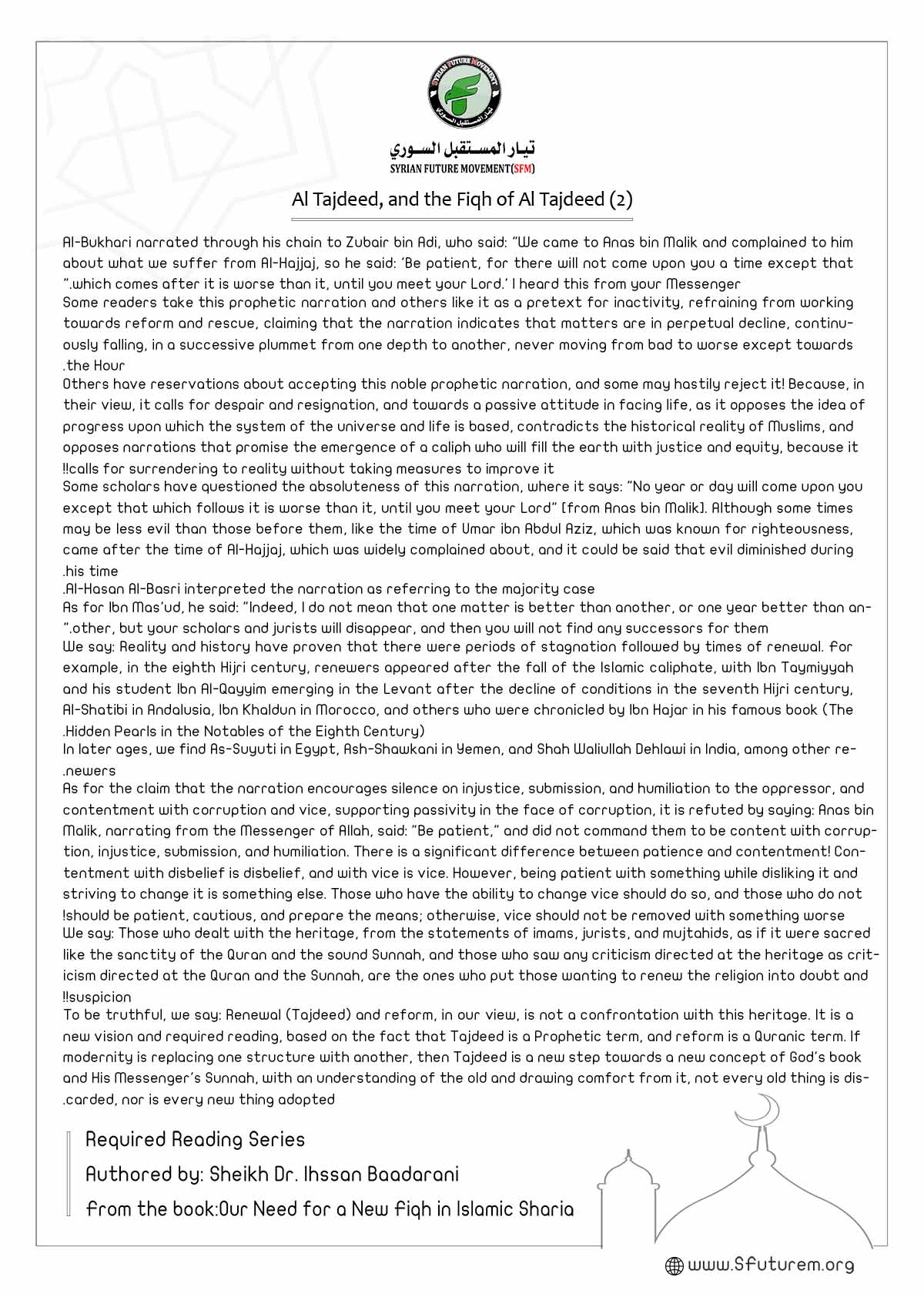5- Renewal and the fiqh of renewal (2): Dr. Ihssan Baadarani

Al-Bukhari narrated through his chain to Zubair bin Adi, who said: “We came to Anas bin Malik and complained to him about what we suffer from Al-Hajjaj, so he said: ‘Be patient, for there will not come upon you a time except that which comes after it is worse than it, until you meet your Lord.’ I heard this from your Messenger.”
Some readers take this prophetic narration and others like it as a pretext for inactivity, refraining from working towards reform and rescue, claiming that the narration indicates that matters are in perpetual decline, continuously falling, in a successive plummet from one depth to another, never moving from bad to worse except towards the Hour.
Others have reservations about accepting this noble prophetic narration, and some may hastily reject it! Because, in their view, it calls for despair and resignation, and towards a passive attitude in facing life, as it opposes the idea of progress upon which the system of the universe and life is based, contradicts the historical reality of Muslims, and opposes narrations that promise the emergence of a caliph who will fill the earth with justice and equity, because it calls for surrendering to reality without taking measures to improve it!!
Some scholars have questioned the absoluteness of this narration, where it says: “No year or day will come upon you except that which follows it is worse than it, until you meet your Lord” [from Anas bin Malik]. Although some times may be less evil than those before them, like the time of Umar ibn Abdul Aziz, which was known for righteousness, came after the time of Al-Hajjaj, which was widely complained about, and it could be said that evil diminished during his time.
Al-Hasan Al-Basri interpreted the narration as referring to the majority case.
As for Ibn Mas’ud, he said: “Indeed, I do not mean that one matter is better than another, or one year better than another, but your scholars and jurists will disappear, and then you will not find any successors for them.”
We say: Reality and history have proven that there were periods of stagnation followed by times of renewal. For example, in the eighth Hijri century, renewers appeared after the fall of the Islamic caliphate, with Ibn Taymiyyah and his student Ibn Al-Qayyim emerging in the Levant after the decline of conditions in the seventh Hijri century, Al-Shatibi in Andalusia, Ibn Khaldun in Morocco, and others who were chronicled by Ibn Hajar in his famous book (The Hidden Pearls in the Notables of the Eighth Century).
In later ages, we find As-Suyuti in Egypt, Ash-Shawkani in Yemen, and Shah Waliullah Dehlawi in India, among other renewers.
As for the claim that the narration encourages silence on injustice, submission, and humiliation to the oppressor, and contentment with corruption and vice, supporting passivity in the face of corruption, it is refuted by saying: Anas bin Malik, narrating from the Messenger of Allah, said: “Be patient,” and did not command them to be content with corruption, injustice, submission, and humiliation. There is a significant difference between patience and contentment! Contentment with disbelief is disbelief, and with vice is vice. However, being patient with something while disliking it and striving to change it is something else. Those who have the ability to change vice should do so, and those who do not should be patient, cautious, and prepare the means; otherwise, vice should not be removed with something worse!
We say: Those who dealt with the heritage, from the statements of imams, jurists, and mujtahids, as if it were sacred like the sanctity of the Quran and the sound Sunnah, and those who saw any criticism directed at the heritage as criticism directed at the Quran and the Sunnah, are the ones who put those wanting to renew the religion into doubt and suspicion!!
To be truthful, we say: Renewal (Tajdeed) and reform, in our view, is not a confrontation with this heritage. It is a new vision and required reading, based on the fact that Tajdeed is a Prophetic term, and reform is a Quranic term. If modernity is replacing one structure with another, then Tajdeed is a new step towards a new concept of God’s book and His Messenger’s Sunnah, with an understanding of the old and drawing comfort from it, not every old thing is discarded, nor is every new thing adopted.






